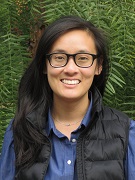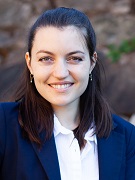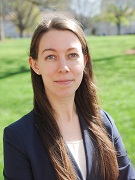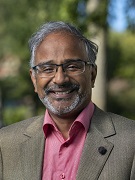
 Kirk Bansak is an Assistant Professor in the Department of Political Science at the University of California, Berkeley. His research interests are in algorithmic decision-making, causal inference, experimental design and analysis, immigration policy, and public opinion. He is the inaugural Faculty Director of the Yardi Scholarship at UC Berkeley, a faculty affiliate of the Immigration Policy Lab at Stanford University and ETH Zurich, and a faculty affiliate of the Berkeley Interdisciplinary Migration Initiative. His research has appeared or is forthcoming in Science, Nature, American Political Science Review, Journal of Politics, Political Analysis, Statistical Science, Journal of the Royal Statistical Society: Series A, Operations Research, Nature Human Behaviour, PNAS Nexus, Political Science Research and Methods, Legislative Studies Quarterly, and the International Conference on Artificial Intelligence and Statistics (AISTATS).
Kirk Bansak is an Assistant Professor in the Department of Political Science at the University of California, Berkeley. His research interests are in algorithmic decision-making, causal inference, experimental design and analysis, immigration policy, and public opinion. He is the inaugural Faculty Director of the Yardi Scholarship at UC Berkeley, a faculty affiliate of the Immigration Policy Lab at Stanford University and ETH Zurich, and a faculty affiliate of the Berkeley Interdisciplinary Migration Initiative. His research has appeared or is forthcoming in Science, Nature, American Political Science Review, Journal of Politics, Political Analysis, Statistical Science, Journal of the Royal Statistical Society: Series A, Operations Research, Nature Human Behaviour, PNAS Nexus, Political Science Research and Methods, Legislative Studies Quarterly, and the International Conference on Artificial Intelligence and Statistics (AISTATS).
 Virginia Eubanks is an Associate Professor of Political Science at the University at Albany, SUNY. She is the author of Automating Inequality: How High-Tech Tools Profile, Police, and Punish the Poor. Her investigative reporting and personal essays have appeared in The New York Times Magazine, Scientific American, The Nation, Harper’s, and Wired. She is currently working on a memoir about PTSD, caregiving, and wilderness survival. With Andrea Quijada, she is gathering global oral histories of the automated welfare state for Voice of Witness. She lives in Troy, NY.
Virginia Eubanks is an Associate Professor of Political Science at the University at Albany, SUNY. She is the author of Automating Inequality: How High-Tech Tools Profile, Police, and Punish the Poor. Her investigative reporting and personal essays have appeared in The New York Times Magazine, Scientific American, The Nation, Harper’s, and Wired. She is currently working on a memoir about PTSD, caregiving, and wilderness survival. With Andrea Quijada, she is gathering global oral histories of the automated welfare state for Voice of Witness. She lives in Troy, NY.
 Alan Gerber is Sterling Professor of Political Science, director of the Institution for Social and Policy Studies, and professor of economics and of and statistics and data science at Yale University. He also has affiliations in the Yale School of Public Health and the Jackson School of Global Affairs. His current research focuses on the political economy of evidence production and use in public policy and organizations.
Alan Gerber is Sterling Professor of Political Science, director of the Institution for Social and Policy Studies, and professor of economics and of and statistics and data science at Yale University. He also has affiliations in the Yale School of Public Health and the Jackson School of Global Affairs. His current research focuses on the political economy of evidence production and use in public policy and organizations.
 Melody Huang is currently a Postdoctoral Fellow at Harvard. Her research primarily focuses on building statistical tools to credibly estimate causal effects under real-world complications. Recently, she has been working on developing methodological approaches to evaluate the impact of AI-assisted decision-making systems. Melody graduated from UC Berkeley with a Ph.D. in Statistics in 2023, and will be joining Yale’s Political Science department as an Assistant Professor this upcoming fall.
Melody Huang is currently a Postdoctoral Fellow at Harvard. Her research primarily focuses on building statistical tools to credibly estimate causal effects under real-world complications. Recently, she has been working on developing methodological approaches to evaluate the impact of AI-assisted decision-making systems. Melody graduated from UC Berkeley with a Ph.D. in Statistics in 2023, and will be joining Yale’s Political Science department as an Assistant Professor this upcoming fall.
 Matthias Haslberger is a postdoctoral researcher at the School of Economics and Political Science at the University of St. Gallen. His research focuses on the effects of generative AI and technological change more broadly on labour markets and education systems. Additionally, he works on the political causes and consequences of economic inequalities, with a particular interest in housing. He holds a PhD in Social Policy from the University of Oxford.
Matthias Haslberger is a postdoctoral researcher at the School of Economics and Political Science at the University of St. Gallen. His research focuses on the effects of generative AI and technological change more broadly on labour markets and education systems. Additionally, he works on the political causes and consequences of economic inequalities, with a particular interest in housing. He holds a PhD in Social Policy from the University of Oxford.
 Hélène Landemore is Professor of Political Science (with a specialization in political theory). Her research and teaching interests include democratic theory, political epistemology, theories of justice, the philosophy of social sciences (particularly economics), constitutional processes and theories, and workplace democracy.
Hélène Landemore is Professor of Political Science (with a specialization in political theory). Her research and teaching interests include democratic theory, political epistemology, theories of justice, the philosophy of social sciences (particularly economics), constitutional processes and theories, and workplace democracy.
 Seulki Lee-Geiller is an Associate Research Scientist in the Democratic Innovations Program at the Institute for Social and Policy Studies (ISPS). She is an award-winning interdisciplinary researcher working at the intersection of technology and democratic governance. Utilizing a variety of methodologies—including qualitative analysis, statistical methods, machine learning, and behavioral experiments—Dr. Lee-Geiller is dedicated to uncovering the underlying principles of interactions among different social entities, as well as their engagements with technologies within a governance context. Her current research focuses on the impact of AI usage in policymaking and election campaigns on public perceptions. Dr. Lee-Geiller possesses a diverse professional background in strategic planning and policy research across both private and public sectors. She earned her Ph.D. in Global Affairs from Rutgers University–Newark, an MSc in Development Administration and Planning from University College London, and a BA in Political Science and Economics from Sookmyung Women’s University.
Seulki Lee-Geiller is an Associate Research Scientist in the Democratic Innovations Program at the Institute for Social and Policy Studies (ISPS). She is an award-winning interdisciplinary researcher working at the intersection of technology and democratic governance. Utilizing a variety of methodologies—including qualitative analysis, statistical methods, machine learning, and behavioral experiments—Dr. Lee-Geiller is dedicated to uncovering the underlying principles of interactions among different social entities, as well as their engagements with technologies within a governance context. Her current research focuses on the impact of AI usage in policymaking and election campaigns on public perceptions. Dr. Lee-Geiller possesses a diverse professional background in strategic planning and policy research across both private and public sectors. She earned her Ph.D. in Global Affairs from Rutgers University–Newark, an MSc in Development Administration and Planning from University College London, and a BA in Political Science and Economics from Sookmyung Women’s University.
 Eliza Oak is a 4th-year political science PhD candidate at Yale advised by Alan Gerber. Her dissertation researches innovations in technology and democracy. She uses experimental and computational methods to study questions about political behavior and democratic institutions in online governance settings, focusing on the decentralized governance of blockchain-based “web3” platforms.
Eliza Oak is a 4th-year political science PhD candidate at Yale advised by Alan Gerber. Her dissertation researches innovations in technology and democracy. She uses experimental and computational methods to study questions about political behavior and democratic institutions in online governance settings, focusing on the decentralized governance of blockchain-based “web3” platforms.
 Dasha Pruss is a fellow at the Berkman Klein Center for Internet & Society and a postdoctoral fellow in the Embedded EthiCS program at Harvard University. She received her PhD in history & philosophy of science from the University of Pittsburgh in 2023. Her research critically interrogates the social dimensions of algorithmic decision-making systems in the US criminal legal system.
Dasha Pruss is a fellow at the Berkman Klein Center for Internet & Society and a postdoctoral fellow in the Embedded EthiCS program at Harvard University. She received her PhD in history & philosophy of science from the University of Pittsburgh in 2023. Her research critically interrogates the social dimensions of algorithmic decision-making systems in the US criminal legal system.
 Shir Raviv is a postdoctoral researcher at the Data Science Institute at Columbia University and a non-resident fellow at the Democratic Innovations Program at ISPS. Her research focuses on the politics of AI and the public debate over its regulation. She uses surveys and field experiments to explore the conditions under which citizens are willing to accept the use of AI across high-stakes policy domains and how these views change over time as people become more engaged with the technology and its implications.
Shir Raviv is a postdoctoral researcher at the Data Science Institute at Columbia University and a non-resident fellow at the Democratic Innovations Program at ISPS. Her research focuses on the politics of AI and the public debate over its regulation. She uses surveys and field experiments to explore the conditions under which citizens are willing to accept the use of AI across high-stakes policy domains and how these views change over time as people become more engaged with the technology and its implications.
 Daniel Schiff is an Assistant Professor of Technology Policy at Purdue University’s Department of Political Science and the Co-Director of GRAIL, the Governance and Responsible AI Lab. He studies the formal and informal governance of AI through policy and industry, as well as AI’s social and ethical implications in domains like education, labor, and criminal justice.
Daniel Schiff is an Assistant Professor of Technology Policy at Purdue University’s Department of Political Science and the Co-Director of GRAIL, the Governance and Responsible AI Lab. He studies the formal and informal governance of AI through policy and industry, as well as AI’s social and ethical implications in domains like education, labor, and criminal justice.
 Kaylyn Jackson Schiff is an Assistant Professor in the Department of Political Science at Purdue University, Co-Director of the Governance and Responsible AI Lab (GRAIL), and a former Postdoctoral Associate with ISPS at Yale. Kaylyn’s research addresses the impacts of emerging technologies on government and society. She studies how technological developments are changing citizen-government contact and service provision, and she explores public and elite opinion on artificial intelligence in government.
Kaylyn Jackson Schiff is an Assistant Professor in the Department of Political Science at Purdue University, Co-Director of the Governance and Responsible AI Lab (GRAIL), and a former Postdoctoral Associate with ISPS at Yale. Kaylyn’s research addresses the impacts of emerging technologies on government and society. She studies how technological developments are changing citizen-government contact and service provision, and she explores public and elite opinion on artificial intelligence in government.
 Suresh Venkatasubramania is a Professor of Computer Science and Data Science at Brown University. His research focuses on algorithmic fairness and the societal impact of automated decision-making systems. Suresh recently finished a stint in the Biden-Harris administration, where he served as Assistant Director for Science and Justice in the White House Office of Science and Technology Policy. In that capacity, he helped co-author the Blueprint for an AI BIll of Rights.
Suresh Venkatasubramania is a Professor of Computer Science and Data Science at Brown University. His research focuses on algorithmic fairness and the societal impact of automated decision-making systems. Suresh recently finished a stint in the Biden-Harris administration, where he served as Assistant Director for Science and Justice in the White House Office of Science and Technology Policy. In that capacity, he helped co-author the Blueprint for an AI BIll of Rights.
Eddie Yang is a PhD candidate in political science at UC San Diego. His research focuses on the authoritarian politics of Artificial Intelligence. He was previously an intern at Microsoft Research and a CDDRL/HAI Fellow at Stanford University.
 Baobao Zhang is the Maxwell Dean Assistant Professor of the Politics of AI in the Political Science Department at the Maxwell School of Citizenship and Public Affairs, Syracuse University. She is also a Schmidt Futures AI2050 Early Career Fellow and a research affiliate with the Centre for the Governance of AI. Her current research focuses on trust in digital technology and the governance of artificial intelligence (AI). She studies (1) public and elite opinion toward AI and (2) how the American welfare state could adapt to the increasing automation of labor. Her previous research covered a wide range of topics, including the politics of the U.S. welfare state, attitudes towards climate change, and survey methodology. She graduated with a PhD in political science (2020) and an MA in statistics (2015) from Yale University. In 2020-2021, I worked as a Klarman Postdoctoral Fellow in the Cornell Society of Fellows. In 2019-2020, she worked as a postdoctoral fellow in MIT’s Political Science Department and a fellow at the Berkman Klein Center for Internet and Society at Harvard University. In 2021-2023, she was a CIFAR Azrieli Global Scholar in the Innovation, Equity & The Future of Prosperity Program.
Baobao Zhang is the Maxwell Dean Assistant Professor of the Politics of AI in the Political Science Department at the Maxwell School of Citizenship and Public Affairs, Syracuse University. She is also a Schmidt Futures AI2050 Early Career Fellow and a research affiliate with the Centre for the Governance of AI. Her current research focuses on trust in digital technology and the governance of artificial intelligence (AI). She studies (1) public and elite opinion toward AI and (2) how the American welfare state could adapt to the increasing automation of labor. Her previous research covered a wide range of topics, including the politics of the U.S. welfare state, attitudes towards climate change, and survey methodology. She graduated with a PhD in political science (2020) and an MA in statistics (2015) from Yale University. In 2020-2021, I worked as a Klarman Postdoctoral Fellow in the Cornell Society of Fellows. In 2019-2020, she worked as a postdoctoral fellow in MIT’s Political Science Department and a fellow at the Berkman Klein Center for Internet and Society at Harvard University. In 2021-2023, she was a CIFAR Azrieli Global Scholar in the Innovation, Equity & The Future of Prosperity Program.